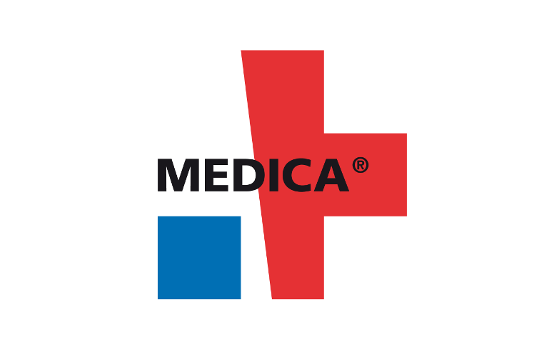 18 - 21 November 2019, Düsseldorf, Germany.
18 - 21 November 2019, Düsseldorf, Germany.More dynamic, more digital and more networked than ever: the medical industry is taking strides into the future. If you want to be in peak condition for taking on the challenges of tomorrow, you need to keep your finger on the pulse, inform yourself and deepen your exchanges with specialists. MEDICA has been offering the best opportunities to do this for almost 50 years.
Exhibitors, visitors and medical representatives from all over the world will come together again at the world’s biggest leading medical trade fair, held in November in Düsseldorf this year (run time: 18 - 21/11/2019). Three-quarters of the booked space of all 5,450 exhibitors will be accounted for by international participations. Trade visitors from over 170 nations are expected.
This year COMPAMED will once again be taking place for the 28th time, in parallel with MEDICA 2019. It will host almost 800 exhibitors (in Halls 8a and 8b). COMPAMED, a supplier trade fair, has become the ultimate hotspot for complex high-tech solutions and services throughout the entire value-added chain for the medical technology industry and is now the international leading event in its segment.
The increasing digitalisation of processes in the healthcare economy will remain a top theme this year. This prevailing trend will not only be represented by exhibitor innovations at MEDICA 2019 but is also reflected in the programmes of the accompanying conferences and forums.
For example, the 42nd German Hospital Conference (which looks at digitalisation projects within clinics among other elements), the MEDICA HEALTH IT FORUM (on IT topics such as big data, artificial intelligence and cyber security), the MEDICA CONNECTED HEALTHCARE FORUM (hardware and software solutions for connected healthcare) and the MEDICA MEDICINE & SPORTS CONFERENCE, held entirely in English, which takes a look at the use of applications which are used in close proximity to the body and wearables for monitoring vital signs, along with other items.
New themed organization of the trade fair halls
The MEDICA runs through the entire spectrum of needs for outpatient and inpatient care via a clearly structured schema: the halls are split into themes. The themes for the halls are as follows: Electromedicine / medical technology (approx. 2,500 exhibitors), laboratory technology / diagnostics, physiotherapy / orthopaedic technology, commodities and consumables, information and communication technology, medical furniture and specialist furnishings for hospitals and practices.This year, we have reshuffled the location of the themes in the trade fair halls. Due to the increasing convergence of software and hardware, especially in the fields of medical technology, the MEDICA information and communication technology segment will be moved from Hall 15 to Hall 13, where it is directly connected to the halls for medical technology and electromedicine.
Manufacturers of surgical instruments, on the other hand, will leave Hall 13 to move thematically closer to providers of imaging technology (e.g. endoscopy) as well as complete solutions for modern hybrid operating rooms in Halls 10 and 11. "With regard to performance and cost aspects, the operating room segment is possibly the most relevant interface of every treatment workflow and therefore particularly important for a clinic's success. At MEDICA, we show top decision makers state-of-the-art technology and operating room organisation with short distances in concentrated spaces," says Wolfram Diener, emphasising the clear benefits the new hall structure offers visitors.
The exhibitors in the laboratory technology & diagnostics area will be placed in the newly built Hall 1 for the first time ever. Here, Abbott and Euroimmun are two of the biggest stars on our list of renowned returning exhibitors.
A pioneering program - the MEDICA START-UP PARK is booming!
Along with digital health applications and the medical technology, start-ups deserve special attention. The number of start-ups at MEDICA has grown constantly over the past few years, giving this event the international top spot in the start-up arena too. Now, several hundred young and mostly digitally driven companies come to Düsseldorf to meet their international specialist audience and present their ideas and sparkling new innovations to them.Pioneering innovations are, for instance, present in the live presentations in the MEDICA DISRUPT programme (held within the scope of the MEDICA CONNECTED HEALTHCARE FORUM in Hall 13). In the pitches, we take a look at new solutions for diagnostics and health monitoring from the start ups. The health monitoring includes taking blood pressure, lab-on-skin technology and biomarker analysis, to give a few examples. Other topics include modern antenatal classes for parents based on eLearning modules with experts available online for advice and exemplary implementation of artificial intelligence (AI) and big data to classify and document ulcers and wounds.
While the MEDICA DISRUPT sessions offer start-ups a stage for entertaining presentations, the MEDICA START-UP PARK in Hall 13 is set up to be a fixed meeting point throughout the entire run of the trade fair, ensuring that contact can be made with these young companies who are headed for success, and to provide a platform for discussing their creative product concepts.
The Polish development team from SensDx will be among the 37 participants from 17 nations at the fully-booked MEDICA START-UP PARK. They will present their software and hardware application which performs a quick test for upper respiratory tract infections. The application is built around a multi-sensor. This can detect the flu virus in its early stages of development. This facilitates selection of the subsequent therapy and prevents unnecessary antibiotics from being prescribed; they’re useless against viral infections.
Rehago, from Reutlingen University, is a German start-up that will also be presenting at the MEDICA START-UP PARK. Rehago specialises in virtual reality applications that can be used as a training activity in rehabilitation of hemiplegic patients, patients with muscular spasms or hemispatial neglect (an attention disorder caused by brain lesions).
Information and all programmes for the forums and accompanying conferences at MEDICA 2019 can be found online at: https://www.medica-tradefair.com / https://www.compamed-tradefair.com.
Opening times: 10:00 am - 18:00 pm / 18 - 21 November 2019